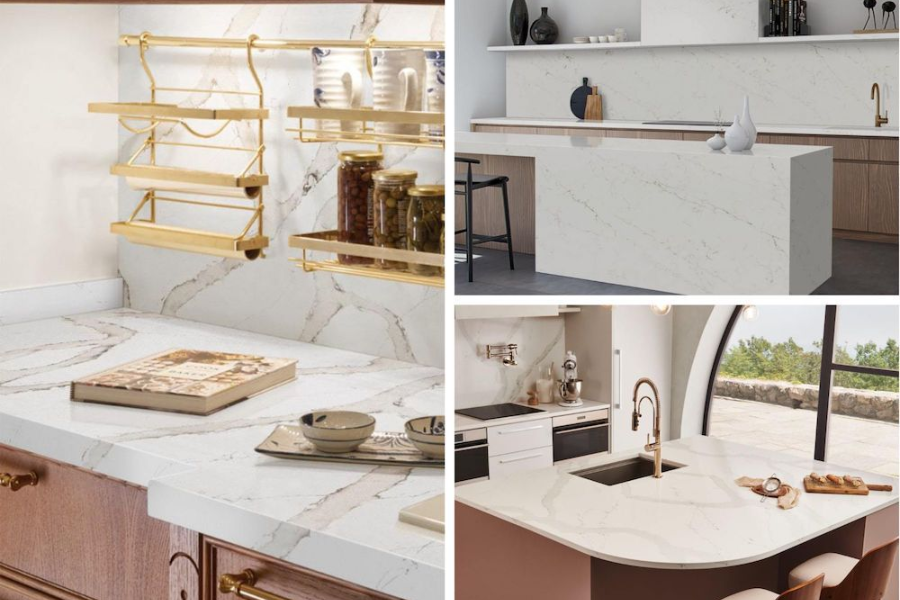MSI Quartz vs Varadara: A Comprehensive Comparison of Countertop Options
Selecting the ideal countertop material for your kitchen or bathroom can be a daunting task, given the multitude of options available. Among the most sought-after choices are MSI Quartz and Varadara surfaces, each offering distinct features and benefits that cater to different needs and aesthetic preferences. This guide delves into a thorough comparison of MSI Quartz vs Varadara, providing you with the information needed to make a well-informed decision that aligns with your style, functionality requirements, and budget.
By examining factors such as durability, maintenance, cost, and design versatility, you will gain a clearer understanding of which countertop material may best suit your home. Let’s dive into the specifics of MSI Quartz and Varadara, helping you make the best choice for your space.
A Comprehensive Look At MSI Quartz vs Varadara: Features and Applications
Understanding the differences between MSI Quartz and Varadara is essential when considering countertop materials. Both are engineered stone surfaces made by combining natural quartz with resins and pigments, which results in durable and visually appealing products. However, their distinct attributes and applications set them apart.
Distinctive Characteristics of MSI Quartz
MSI Quartz is an engineered stone crafted from natural quartz crystals, polymer resins, and pigments, resulting in a surface that combines strength with beauty. Here are the key features that make MSI Quartz a top contender in the world of countertops:
- Exceptional Durability: MSI Quartz countertops are known for their resistance to scratches, stains, and chips. This makes them a perfect choice for high-traffic areas, especially kitchens where spills, stains, and heavy usage are common.
- Minimal Maintenance Requirements: One of the most significant advantages of MSI Quartz is its low-maintenance nature. Unlike traditional natural stone surfaces, which require regular sealing, MSI Quartz doesn’t need sealing. A simple cleaning routine with soap and water is enough to keep the surface looking fresh and new.
- Diverse Aesthetic Options: MSI Quartz offers a wide range of colors and patterns, ensuring there’s something to suit every style. Whether you prefer classic whites, grays, and blacks or more bold and vibrant hues like blue or green, MSI Quartz offers versatility in design.
- Consistent Appearance: Due to its engineered nature, MSI Quartz surfaces offer uniformity in design, which is ideal for those looking for a consistent and harmonious appearance throughout their countertop.
- Hygienic Non-Porous Surface: The non-porous surface of MSI Quartz helps to reduce the risk of bacteria, mold, and mildew growth, making it a hygienic option, especially in kitchens where cleanliness is crucial.
Versatile Applications for MSI Quartz and Varadara
Both MSI Quartz and Varadara are suitable for a variety of applications, from kitchen countertops and bathroom vanities to backsplashes and commercial spaces. Their durability and aesthetic appeal make them an excellent choice for both residential and commercial settings.
A Closer Look at Varadara: Distinct Features and Comparisons with MSI Quartz
Varadara surfaces present an alternative to MSI Quartz with its own unique characteristics and advantages. While both materials share similar fundamental qualities, Varadara brings a distinct set of attributes that appeal to different preferences, particularly for those seeking a more natural and eco-conscious option.
Standout Characteristics of Varadara
- Distinctive Visual Appeal: One of the most defining features of Varadara surfaces is their natural stone-like appearance. Featuring intricate veining and patterns, Varadara closely mimics the look of granite, marble, and other natural stones, creating a luxurious and unique aesthetic in any room.
- Stain-Resistant Properties: Like MSI Quartz, Varadara is non-porous, making it resistant to stains, spills, and other common messes. This feature is especially beneficial in high-traffic areas where food preparation and cleaning are frequent.
- Eco-Conscious Manufacturing: Varadara places a strong emphasis on sustainability, incorporating recycled materials into their manufacturing processes. For environmentally conscious consumers, Varadara offers an eco-friendly alternative to traditional countertop options.
- Diverse Finishing Options: Varadara provides a variety of finishes, including polished, honed, and textured surfaces, allowing homeowners to select the perfect look to complement their overall design vision. These different finishes provide additional customization options to suit individual tastes.
- Customizable Designs: Varadara allows for customization, offering a wide selection of unique colors and patterns. This flexibility provides homeowners the opportunity to create truly personalized countertops that reflect their individual style and design preferences.
Varadara in the Context of MSI Quartz
When comparing MSI Quartz vs Varadara, it becomes clear that both materials deliver exceptional benefits. MSI Quartz emphasizes low maintenance, durability, and consistency in design, making it perfect for those seeking a reliable and easy-to-care-for option. On the other hand, Varadara’s natural stone-inspired appearance and focus on sustainability appeal to buyers interested in eco-conscious practices and distinctive, customized designs. Understanding these differences will help you decide which material best fits your needs.
A Comprehensive Comparison of MSI Quartz and Varadara: Making the Right Choice
When choosing between MSI Quartz and Varadara, it’s essential to consider several factors that will impact your decision. Let’s break down the most critical aspects of both materials to help you make an informed choice.
Material Composition
Both MSI Quartz and Varadara are engineered stone products made from natural stone particles, resins, and pigments. While the foundational composition is similar, MSI Quartz tends to offer a more consistent appearance, which can appeal to those who want a uniform look. Varadara, however, boasts a more natural stone-like finish with unique veining and color patterns, giving it a more organic and luxurious feel.
Aesthetic Appeal
MSI Quartz offers a wide array of colors and patterns that tend to be more uniform. This consistency can create a sleek, contemporary, and polished look, ideal for modern spaces. Varadara, on the other hand, offers an appearance that closely resembles natural stone, with distinct veining and intricate patterns. If you prefer the look of natural materials with added character, Varadara might be the better option for you.
Maintenance Requirements
Both MSI Quartz and Varadara are low-maintenance options compared to traditional natural stone surfaces. MSI Quartz is particularly easy to care for, requiring only basic cleaning with soap and water. Varadara, while also stain-resistant, may require more specific care depending on the finish. For instance, honed or textured surfaces may need special cleaning products to maintain their appearance. Therefore, if ease of maintenance is a top priority, MSI Quartz might be a more straightforward choice.
Cost Considerations
Cost is an essential factor when selecting between MSI Quartz vs Varadara. MSI Quartz is generally more affordable due to mass production, making it a more budget-friendly option. Varadara, with its emphasis on customization and natural stone aesthetics, may come at a higher price point. It’s important to consider your budget and whether the higher price of Varadara aligns with your desired features.
Eco-Friendliness
For environmentally conscious consumers, Varadara’s commitment to sustainability is a significant factor. Varadara incorporates recycled materials into its production process, reducing its ecological footprint. MSI Quartz also offers quality products but may not emphasize sustainability as much as Varadara does. If minimizing environmental impact is a priority, Varadara may be the better choice.
Weighing the Advantages and Disadvantages of MSI Quartz and Varadara
Advantages of MSI Quartz vs Varadara
- Durability: MSI Quartz is exceptionally durable, offering resistance to scratches, stains, and chips. This makes it a great option for busy kitchens and high-traffic areas.
- Low Maintenance: MSI Quartz is incredibly easy to care for, requiring only simple cleaning routines with soap and water. Its non-porous surface reduces the need for sealing and prevents the growth of bacteria and mold.
- Design Variety: MSI Quartz offers a vast selection of colors and patterns, making it a versatile choice for different design schemes.
- Non-Porous Surface: Both MSI Quartz and Varadara are non-porous, which makes them resistant to stains and easy to clean.
Disadvantages of MSI Quartz vs Varadara
- Limited Unique Aesthetics: MSI Quartz may lack the natural, one-of-a-kind look found in Varadara, particularly for those seeking distinct veining and unique patterns.
- Consistency: While some may appreciate the uniformity of MSI Quartz, others may find it lacks the organic, luxurious character of natural stone options like Varadara.
Advantages of Varadara
- Natural Stone-Like Aesthetics: Varadara offers a unique look with intricate veining and natural patterns, providing a more organic appearance.
- Eco-Friendly: Varadara’s commitment to using recycled materials in its production process makes it a more sustainable choice for eco-conscious buyers.
- Customization: Varadara allows for customization, enabling homeowners to create countertops tailored to their style and preferences.
Disadvantages of Varadara
- Higher Costs: Due to its emphasis on customization and natural stone-like features, Varadara may come at a higher price point compared to MSI Quartz.
- Maintenance Variability: Depending on the finish you select, Varadara may require different cleaning methods, which could be a drawback for those seeking low-maintenance solutions.
Factors to Consider in Your Selection: MSI Quartz vs Varadara
1. Aesthetic Preferences
Your aesthetic vision plays a crucial role in your decision. If you prefer a sleek, modern look with consistent patterns, MSI Quartz is a great choice. If you desire a more natural appearance with unique veining and character, Varadara’s distinctive patterns will appeal to you.
2. Budget Considerations
If budget is a significant concern, MSI Quartz offers an affordable yet durable option. On the other hand, if you’re willing to invest in custom designs and eco-friendly practices, Varadara might justify its higher price.
3. Maintenance Requirements
MSI Quartz’s easy-to-maintain surface is perfect for those with busy lifestyles, while Varadara’s variety of finishes may require more specific care. Consider how much time you’re willing to dedicate to upkeep.
4. Environmental Considerations
If sustainability is important to you, Varadara’s eco-friendly production process will likely be a deciding factor. For those looking for a product with minimal environmental impact, Varadara stands out.
Conclusion
Choosing between MSI Quartz vs Varadara countertops depends on your aesthetic preferences, budget, maintenance needs, and environmental values. MSI Quartz is perfect for those seeking a durable, low-maintenance, and affordable option, while Varadara offers natural stone aesthetics, customization options, and a focus on sustainability. By evaluating the unique features of each material, you can make an informed decision that will enhance the beauty and functionality of your space for years to come.
Keep up-to-date with breaking news and updates on raterpoint!







